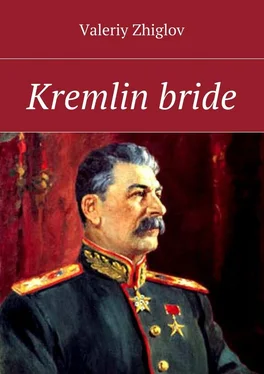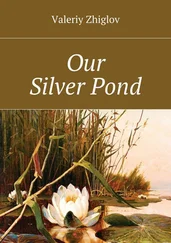Valeriy Zhiglov - Kremlin bride
Здесь есть возможность читать онлайн «Valeriy Zhiglov - Kremlin bride» — ознакомительный отрывок электронной книги совершенно бесплатно, а после прочтения отрывка купить полную версию. В некоторых случаях можно слушать аудио, скачать через торрент в формате fb2 и присутствует краткое содержание. ISBN: , Жанр: foreign_language, russian_contemporary, на английском языке. Описание произведения, (предисловие) а так же отзывы посетителей доступны на портале библиотеки ЛибКат.
- Название:Kremlin bride
- Автор:
- Жанр:
- Год:неизвестен
- ISBN:9785448302855
- Рейтинг книги:5 / 5. Голосов: 1
-
Избранное:Добавить в избранное
- Отзывы:
-
Ваша оценка:
- 100
- 1
- 2
- 3
- 4
- 5
Kremlin bride: краткое содержание, описание и аннотация
Предлагаем к чтению аннотацию, описание, краткое содержание или предисловие (зависит от того, что написал сам автор книги «Kremlin bride»). Если вы не нашли необходимую информацию о книге — напишите в комментариях, мы постараемся отыскать её.
Kremlin bride — читать онлайн ознакомительный отрывок
Ниже представлен текст книги, разбитый по страницам. Система сохранения места последней прочитанной страницы, позволяет с удобством читать онлайн бесплатно книгу «Kremlin bride», без необходимости каждый раз заново искать на чём Вы остановились. Поставьте закладку, и сможете в любой момент перейти на страницу, на которой закончили чтение.
Интервал:
Закладка:
The room was with low ceiling, the cigarette smoke was above our heads. All non-smokers, including me, could barely breath this thick cigarette smog. Our military shift mainly comprised military university graduates, and we all had to complete obligatory military service with military practice as army officers.
After one day, we, hungry and besotted with the cigarette smoke, were put inside a train, and the train departed eastwards. The road was long, more than three days inside the train, during which nobody gave us any food. It was only the fourth day, when we arrived to the railway station Divizionnaya, which was near Ulan-Ude, the capital of Buryat Autonomous Republic. It was here where I had to do my military service, one year in a military hospital.
The hut barracks were former stables, and now they had enough space for around fifty soldiers of the military hospital personnel. Our main meal was pearl barley porridge served thrice a day, with a small exception: there was also potato soup with pasta, and tea with a piece of sugar, or starch drink, for lunch.
Sometimes small pieces of meat or fish were added to this pearl barley porridge, which soldiers also called “tarpaulin”. Those pieces were so small that once I decided to count all vertebrae of fish in my dish of a solder. The piece of fish was less than one centimeter thick, and it comprised exactly three vertebrae of fish. It was then, when I decided to write a story with the title “Three Vertebrae of Fish”.
One day, there was a funny situation during our nighttime guard duty. No need to remind that soldiers were always hungry, and any chance to fill empty stomachs with something eatable was used. It was the feeling of hunger, that brought two soldiers on guard duty into the dark room of soldiers’ kitchen, where they tapped a large metal barrel with the starch drink cooling down.
They later told us that was the moment, when they were so happy, as if the barrel comprised priceless treasure. Without thinking twice, the soldiers took iron cups that were near, and took some warm starch drink and started drinking it. Suddenly, one of them paused drinking and asked another, what might it be that was crisping on teeth, maybe raisins?
They decided to turn on light to resolve the mystery, and they were surprised to see quite an unpleasant picture. Brown cockroaches, myriad of them, were right on the wall of the barrel with the starch drink. Having reached the thin dry crust on the surface of the starch drink, cockroaches started their feast, while new cockroaches were trying to find unoccupied space for the same. However, there were too many of them, therefore, getting there was not easy for them.
Soldiers interrupted their feast and mixed, with their iron cups, all this mass of cockroaches with the drink, and that was what crisped on teeth, in some way like boiled raisins would do. In darkness, they did not recognize the taste of cockroaches.
Later, during army officer practice, I saw cockroaches again, in a buffet, on a cake in a showcase. I told the barmaid about those disgusting cockroaches, and she replied that she shall not even touch those disgusting cockroaches, and in fact she left everything the way it was!
Although winter in Baikal region came quickly, and the air temperature was very cold, we still had to march in a column for breakfast, lunch and dinner, without winter clothes. A senior officer gave an explanation that was a measure against lice. Soon, all windows were covered with thick layer of nontransparent ice, and even water on the floor of the barracks became ice.
The winter between 1973 and 1974 was specifically cold in those lands, the air temperature was below -56 degrees Celsius. For some reason, the military commandment in the region decided to make military exercises lasting for 5 days, to see how the great Soviet army deals with extraordinarily low air temperature. Around ten soldiers with freezing injuries delivered to the hospital for the second day of those exercises convinced the commandment to stop the exercises.
One day, it became warmer outside, and the wind brought some snow. I came to a thermometer and saw the temperature of air was -43 degrees. It meant that within less than a day, the air temperature became 13 degrees higher. Therefore, although -43 degrees was still very cold, one would feel that it became warmer. After I resigned from army, I still, as an army officer, had to be at military exercises many times, but never again in my life did I experience the winter that was that cold and foodless.
In April, when nobody already believed spring would ever come, the air temperature went up, and the hills got covered with nice flowers of ledum in May. That was the time, when radio stations started broadcasting the song about the region behind the lake of Baikal:
“Ledum is blooming somewhere on hills,
Pines are fused with the sky.
It seems the region where I never have been
Has been waiting for me so long!”
Although there was the feeling that the military service was going to last forever, I was discharged from the army after obligatory service late autumn, and went home as a civil person. On my way home in a passenger car with reserved seats, together with other former soldiers, I was singing my favorite song about my beloved friend, accompanied by a guitar:
“I am standing again in a train
Alien land is around me,
I remember your eyes,
Your eyes, my beloved.
Where are you now, my love,
Who is the one your eyes are now shining for,
Who is the one your heart is now beating and soul is full of joy for?
Nobody loves you like I do,
Nobody would care for you like I would,
Nobody would kiss you like I would,
My beloved one, my best one,
Where are you now, my love,
Who is the one your eyes are now shining for,
Who is the one your heart is now beating and soul is full of joy for?”
White Sun of the Desert
After obligatory military service in Soviet army, I began working in a research institute, where many WWII veterans were working. One of them was Andrei Rublev, a former reconnaissance officer.
Time to time, talking privately, he used to tell about some of his adventures, how he, together with his wartime friends, was sent to the enemy territory to gather important secret information about enemy. Only few were lucky enough to come back safe after such reconnaissance raids.
However, those who did make it, and brought priceless information about enemy, the information that was critical for successful military actions by the Soviet Army, were questioned, sometime even humiliated, to disclose those who might be converted by Germans.
When Andrei Rublev, shortly before the end of the war, came back from the enemy territory, he faced a false accusation and sent to do time in one of those remote Stalin’s concentration camps in Siberia. He had to work cutting trees first, and then he took part in constructing strategic military facilities.
In late 1950s, he was rehabilitated by court after long time in the camp, and freed earlier than expected. Having come back to his town, he found job and also began studying a university course that he attended in the evenings after work; he completed the university course successfully, and was hired by a scientific research laboratory in Central Asia.
Andrei Rublev really liked his new job of a science researcher, and he even successfully got the degree in science. Those, who knew him well, were sure everything goes well in his life after hard times he went through.
Andrei Rublev’s wife was a nice woman, and he loved her very much. That was the time when a film crew was working in our area making the movie “White Sun of the Desert”, which later became very popular. As it became known later, one of the senior film crew members was introduced to Andrei Rublev’s wife during some public event, they fell in love, and she abandoned her husband and left those lands to live with her new love.
Читать дальшеИнтервал:
Закладка:
Похожие книги на «Kremlin bride»
Представляем Вашему вниманию похожие книги на «Kremlin bride» списком для выбора. Мы отобрали схожую по названию и смыслу литературу в надежде предоставить читателям больше вариантов отыскать новые, интересные, ещё непрочитанные произведения.
Обсуждение, отзывы о книге «Kremlin bride» и просто собственные мнения читателей. Оставьте ваши комментарии, напишите, что Вы думаете о произведении, его смысле или главных героях. Укажите что конкретно понравилось, а что нет, и почему Вы так считаете.












